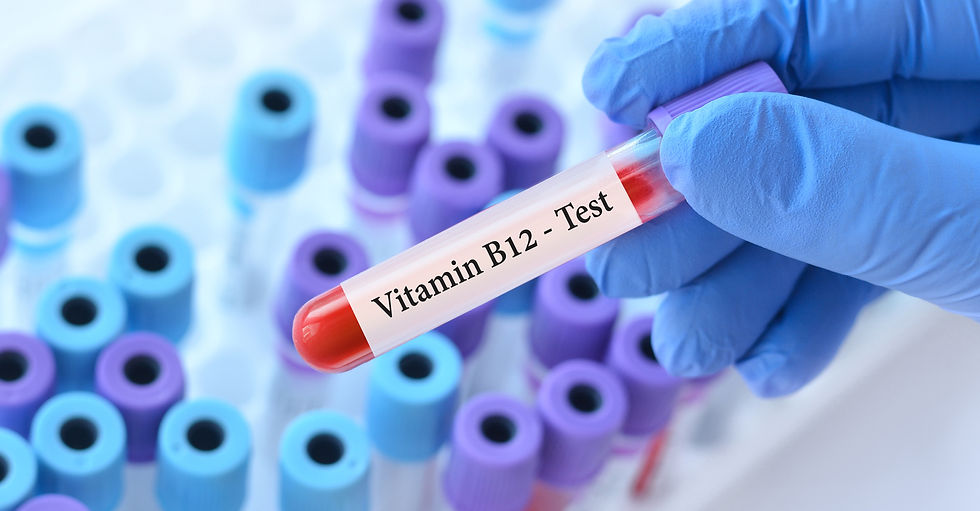Why Cyanocobalamin B12 Is Not Bad for You: Debunking the Myths with Scientific Evidence
- Russell Ausseresses
- Oct 7, 2024
- 3 min read

As GLP-1 medications like Semaglutide and Tirzepatide gain popularity for managing Type 2 diabetes and promoting weight loss, they are often compounded with Cyanocobalamin, a synthetic form of Vitamin B12. Despite the critical role B12 plays in the body, some individuals have raised concerns about Cyanocobalamin, claiming it could be harmful. These misconceptions have fueled a debate about whether Cyanocobalamin is safe for use in compounded medications. Let’s break down why Cyanocobalamin is not bad for you, backed by medical studies and scientific evidence, and why it continues to be a popular and safe choice when combined with GLP-1 medications.
Understanding Cyanocobalamin: What Is It?
Cyanocobalamin is a synthetic form of Vitamin B12 commonly used in supplements and medications. Vitamin B12 is essential for various bodily functions, including red blood cell formation, nerve function, and DNA synthesis. For individuals who have trouble absorbing B12 naturally (due to dietary restrictions, gastrointestinal conditions, or certain medications), Cyanocobalamin provides an effective and reliable source of this vital vitamin.
Cyanocobalamin’s Role in Compounded Medications
Cyanocobalamin is often included in compounded treatments, particularly alongside Semaglutide or Tirzepatide, to support energy levels and metabolism during weight loss and diabetes management. Since some individuals taking GLP-1 medications may experience nutrient depletion or fatigue, B12 supplementation is beneficial to ensure overall health and well-being.
However, some concerns have arisen regarding the safety of Cyanocobalamin, largely due to the fact that it contains cyanide, albeit in minuscule amounts. This has led to a misconception that Cyanocobalamin is harmful to the body—a claim not supported by research.
Debunking the Myths: Is Cyanocobalamin Harmful?
Myth: Cyanocobalamin is Toxic Because It Contains Cyanide
One of the most common myths is that Cyanocobalamin is harmful because it contains cyanide. While it’s true that Cyanocobalamin includes a small amount of cyanide, this amount is insignificant and not harmful to the body. The body easily detoxifies and removes the cyanide when Cyanocobalamin is metabolized.
The cyanide present in Cyanocobalamin is far below toxic levels. According to a 2007 study in the British Journal of Nutrition, the minute levels of cyanide from Cyanocobalamin are harmless, especially when compared to natural sources of cyanide in foods like almonds and spinach—foods that are commonly consumed without issue (Diabetes Journals).
Myth: Cyanocobalamin Is Inferior to Other Forms of B12
Another common argument is that Cyanocobalamin is less effective or inferior to other forms of Vitamin B12, such as Methylcobalamin or Hydroxocobalamin. However, research shows that Cyanocobalamin is highly bioavailable and effectively raises B12 levels in the body. A study published in the American Journal of Clinical Nutrition found that Cyanocobalamin was as effective as other forms of B12 in correcting B12 deficiencies (Diabetes Journals).
In clinical practice, Cyanocobalamin remains one of the most commonly used forms of B12 because it is stable, cost-effective, and effective at raising B12 levels. It has been safely used in millions of doses globally for decades.
The Medical Consensus: Cyanocobalamin is Safe and Effective
Numerous studies have confirmed the safety and efficacy of Cyanocobalamin. The National Institutes of Health (NIH) and the World Health Organization (WHO) both recognize Cyanocobalamin as a safe form of Vitamin B12 supplementation. When used in appropriate doses, it is well tolerated and poses no significant risk to human health(Diabetes Journals) (Frontiers).
In a 2020 review in the journal Nutrients, researchers concluded that Cyanocobalamin is a safe and effective option for addressing Vitamin B12 deficiencies in various populations, including those taking compounded medications (Diabetes Journals). The review noted that while some individuals may prefer different forms of B12 for personal reasons, Cyanocobalamin remains an excellent choice for most people.
Conclusion: Cyanocobalamin is Safe, Effective, and Beneficial in GLP-1 Therapy
There is no evidence to support claims that Cyanocobalamin is harmful when used as part of a compounded medication. On the contrary, it is a proven, safe, and effective form of Vitamin B12 that helps patients maintain optimal health while on Semaglutide or Tirzepatide therapy. The trace amounts of cyanide present are insignificant and pose no health risks, as confirmed by multiple studies and medical experts.
For prescribers and patients alike, Cyanocobalamin provides an accessible and efficient way to ensure Vitamin B12 levels remain adequate, especially in combination with powerful weight-loss and diabetes treatments like GLP-1 medications. Always consult with your healthcare provider or pharmacist before starting any new medication regimen to ensure that you are receiving the most appropriate treatment for your individual needs.
%20(2).png)
Comments